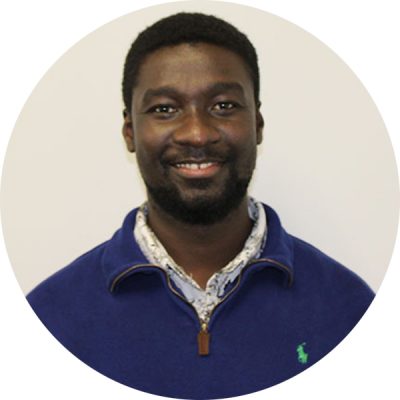
James Osei-Owusu
Acidic pH is crucial for the function of intracellular organelles in the secretory and endocytic pathways. Furthermore, it is one of the pathological hallmarks of many diseases, including cerebral and cardiac ischemia, cancer, infection and inflammation. However, the molecular mechanisms of acid sensing and regulation are not fully understood.
Exposure of cells to acidic conditions activates a ubiquitous proton-activated Clˉ channel, whose molecular identity has been a long-standing mystery in the field. Through an unbiased RNAi screen, the Qiu lab recently identified a novel and evolutionarily conserved membrane protein, PAC (encoded by PACC1 gene), as the proton-activated chloride channel. The discovery of such a new ion channel represents a major breakthrough, making it possible to reveal its fundamental structural and functional properties. I joined the Qiu lab when it opened its door at Hopkins five years ago, and decided to focus on this exciting new Clˉ gatekeeper.
Taking advantage of single-particle cryo-electron microscopy, we solved two distinct cryo-EM structures of human PAC at a high-pH resting closed state (pH 8.0) and a low-pH, proton-bound, nonconducting state (pH 4.0). I identified key residues critical for pH sensing mechanism, channel inactivation and anion selectivity. My work provides the first glimpse of the molecular assembly of PAC, and a basis for understanding the mechanism of proton-dependent activation.
We also showed that PAC, initially identified as a plasma membrane protein, traffics to the endosomes. It encodes a bona fide acid-sensitive Clˉ leak channel in endosomes and regulates endosomal pH, Clˉ level, and transferrin-receptor-mediated endocytosis. My research has uncovered a mechanism of endosomal Clˉ permeability and revealed a previously unappreciated complexity in endosomal biology.
Questions & Answers
Why did you choose Johns Hopkins for your work?
I was initially drawn to Johns Hopkins because it is one of the leading research institutions in the world. Upon meeting and interacting with the awesome faculty and students in the Department of Physiology, I was fully convinced that Johns Hopkins is the place for me to pursue my Ph.D. training.
What does receiving this award mean to you personally and professionally? Do you have any connection with the particular award you received?
It is indeed a great honor to be a recipient of the Martin and Carol Macht Research Award. It serves as tangible evidence of the value that others see in my work, and that’s really all a scientist could ask for. I am particularly excited about this award because Martin Macht did his graduate work in the Department of Physiology, where I am currently receiving my Ph.D. training.
What contributed to your project’s success?
Mentorship. I am very fortunate to receive good training from my adviser, Zhaozhu Qiu. His training, together with help and guidance from my thesis committee members were instrumental to the success of this project. My labmates and members of the physiology department contributed to this success through numerous scientific discussions.
What thoughts do you have about Young Investigators’ Day itself, as a celebration of the roles students and fellows play in research at Johns Hopkins?
This celebration is a reward for all the hard work and times we have persevered through self-doubt. Knowing that my work is recognized by the entire Johns Hopkins community brings me a lot of joy and encouragement to keep doing what I am doing. I’m also very excited about the opportunity to talk about my research and exchange new ideas with the diverse research community at Hopkins.
What has been your best/most memorable experience while at Johns Hopkins?
I have had many memorable moments at Hopkins, but the most memorable were the late-night tea/coffee/snack break discussions I had with lab and floor mates (second floor WBSB) in the physiology department. It was a great time to share ideas, discuss social issues and support each other.
What are your plans over the next year or so?
I am looking forward to graduating this summer and continuing with a postdoc to further my training.
Tell us something interesting about yourself.
I am fascinated by history. I have always been intrigued by the diverse cultures in the world and their historical journeys. I enjoy getting to know people and their stories.